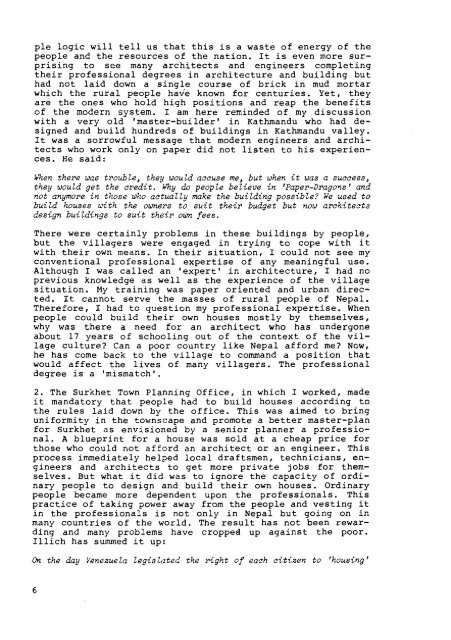Ifda dossier 47, May/June 1985
Ifda dossier 47, May/June 1985
Ifda dossier 47, May/June 1985
You also want an ePaper? Increase the reach of your titles
YUMPU automatically turns print PDFs into web optimized ePapers that Google loves.
pie logic will tell us that this is a waste of energy of the<br />
people and the resources of the nation. It is even more sur-<br />
prising to see many architects and engineers completing<br />
their professional degrees in architecture and building but<br />
had not laid down a single course of brick in mud mortar<br />
which the rural people have known for centuries. Yet, they<br />
are the ones who hold high positions and reap the benefits<br />
of the modern system. I am here reminded of my discussion<br />
with a very old 'master-builder1 in Kathmandu who had de-<br />
signed and build hundreds of buildings in Kathmandu valley.<br />
It was a sorrowful message that modern engineers and archi-<br />
tects who work only on paper did not listen to his experien-<br />
ces. He said:<br />
When there was trouble, they would accuse me, but when it was a success,<br />
they would get the credit. Why do people believe in 'Paper-Dragons' and<br />
not anymore in those who actually make the building possible? We used to<br />
build houses uith the owners to suit their budget but now architects<br />
design buildings to suit their own fees.<br />
There were certainly problems in these buildings by people,<br />
but the villagers were engaged in trying to cope with it<br />
with their own means. In their situation, I could not see my<br />
conventional professional expertise of any meaningful use.<br />
Although I was called an 'expert' in architecture, I had no<br />
previous knowledge as well as the experience of the village<br />
situation. My training was paper oriented and urban direc-<br />
ted. It cannot serve the masses of rural people of Nepal.<br />
Therefore, I had to question my professional expertise. When<br />
people could build their own houses mostly by themselves,<br />
why was there a need for an architect who has undergone<br />
about 17 years of schooling out of the context of the vil-<br />
lage culture? Can a poor country like Nepal afford me? Now,<br />
he has come back to the village to command a position that<br />
would affect the lives of many villagers. The professional<br />
degree is a 'mismatch'.<br />
2. The Surkhet Town Planning Office, in which I worked, made<br />
it mandatory that people had to build houses according to<br />
the rules laid down by the office. This was aimed to bring<br />
uniformity in the townscape and promote a better master-plan<br />
for Surkhet as envisioned by a senior planner a professio-<br />
nal. A blueprint for a house was sold at a cheap price for<br />
those who could not afford an architect or an engineer. This<br />
process immediately helped local draftsmen, technicians, en-<br />
gineers and architects to get more private jobs for them-<br />
selves. But what it did was to ignore the capacity of ordi-<br />
nary people to design and build their own houses. Ordinary<br />
people became more dependent upon the professionals. This<br />
practice of taking power away from the people and vesting it<br />
in the professionals is not only in Nepal but going on in<br />
many countries of the world. The result has not been rewar-<br />
ding and many problems have cropped up against the poor.<br />
Illich has summed it up:<br />
On the day Venezuela legislated the right of each citizen to 'housing'
















